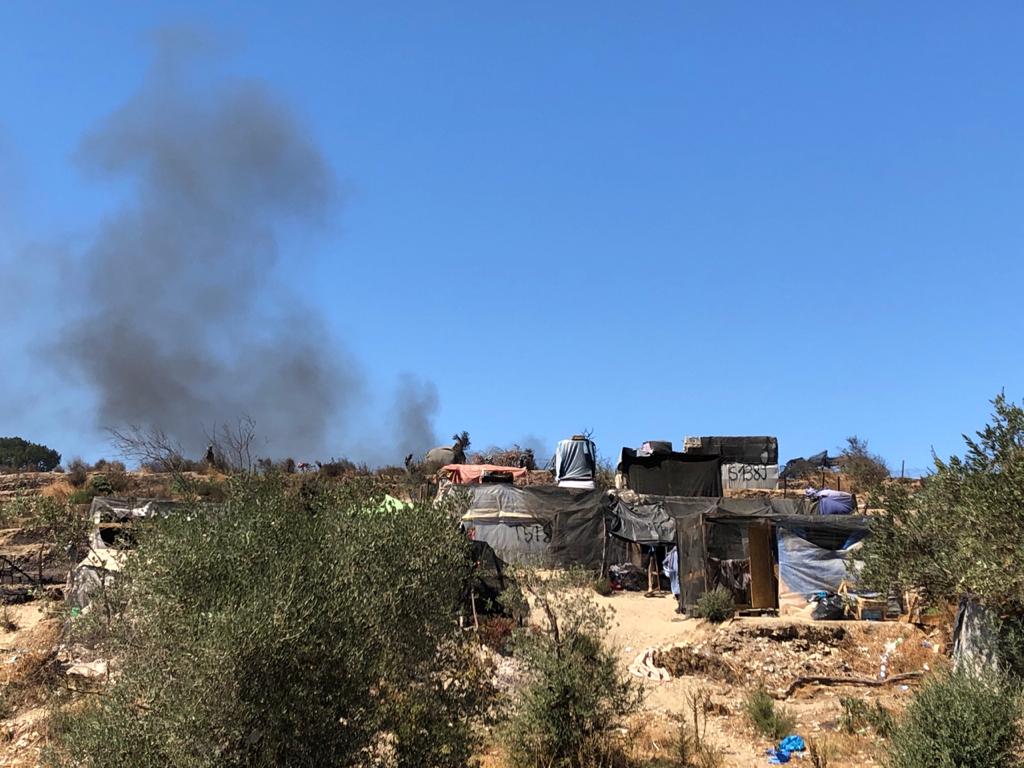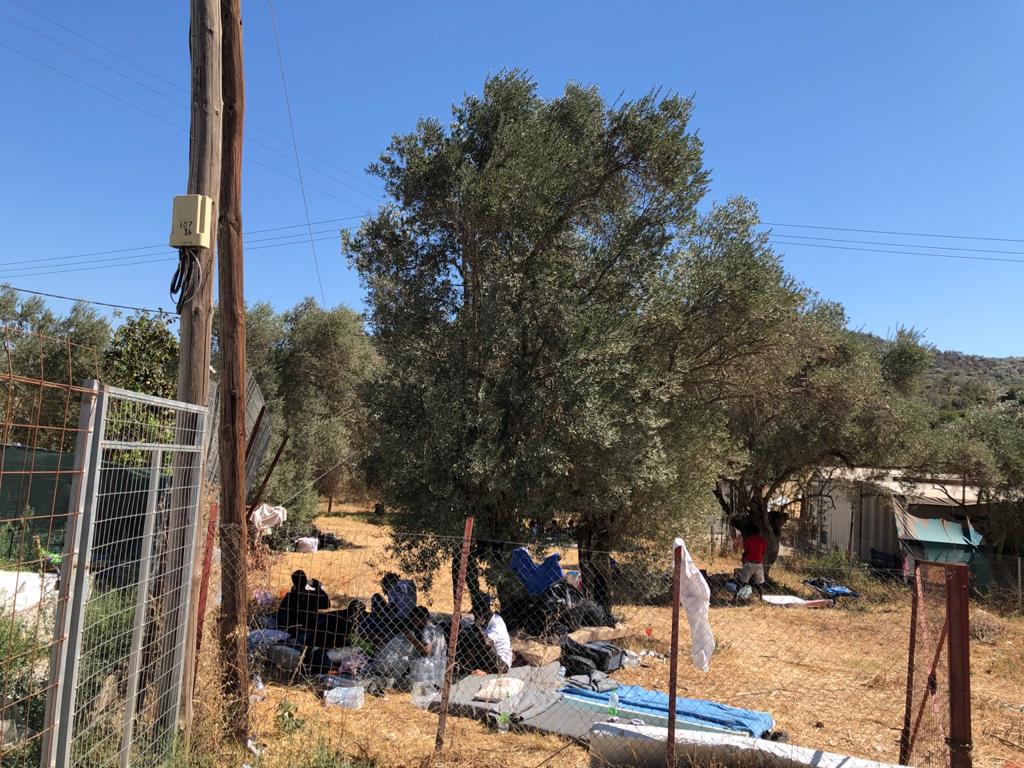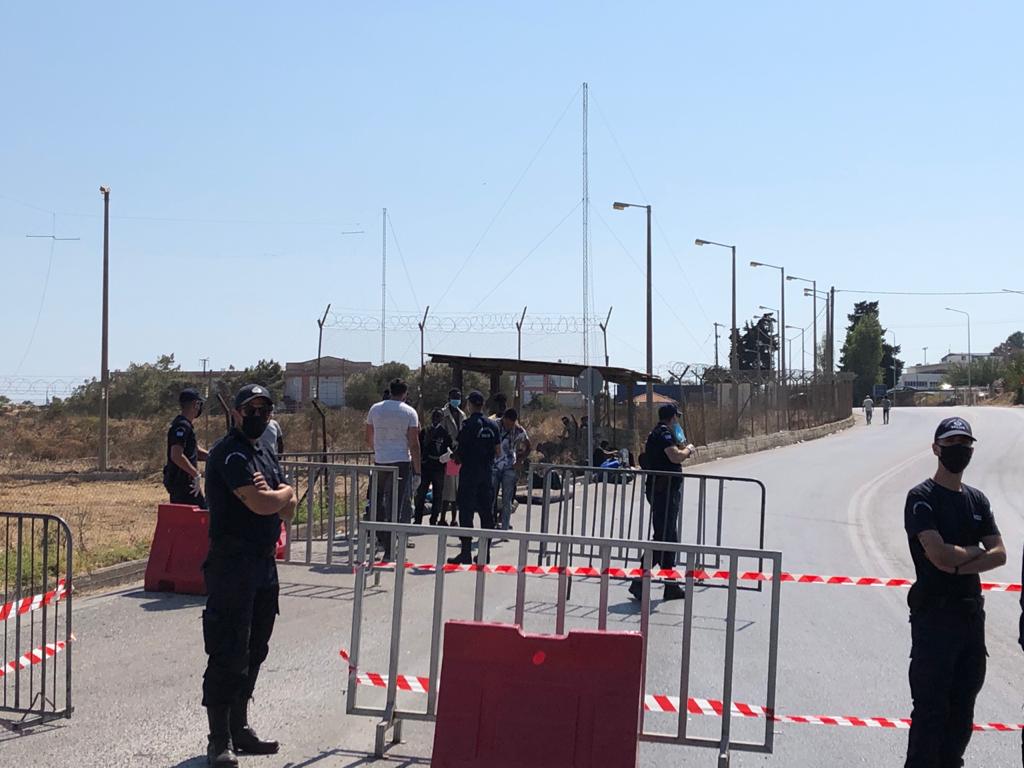The spluttering engines of World War I–era single-propeller planes, converted to water bombers, hummed over the hills of torched olive groves and smoldering wreckage as they battled the flames throughout the week. In the streets below, people who had desperately fled war and oppression—often from conflicts instigated or exacerbated by the United States and NATO—slept rough under the watchful eye of the riot police who penned them in.
The first fires ripped through Moria last Tuesday, sending the inhabitants of Greece’s largest refugee camp—indeed, the largest in Europe, until its destruction—running for their lives and forcing the Greek government and European Union to confront the worsening conditions.
By Thursday afternoon, a series of fires had ravaged every inch of this Greek symbol of migration deterrence. Astonishingly, there were no casualties from the flames; however, a disturbing night of intimidation and violence awaited those who sought assistance in the nearby village.
“All of a sudden we were surrounded by fire and smoke,” said Ahmadjamshid Amiri, a refugee from Afghanistan’s Wardak province, describing how Tuesday night’s blaze forced him to run with only a backpack from his makeshift home in the camp. The son of an engineer working as a contractor for NATO forces, Amiri escaped his homeland after his family was threatened by the Taliban. Forced to run for his life again, he described navigating a gauntlet of flames toward the road leading to the village that the camp is named after.
“When we ran to the village, people hit us with pieces of wood,” he said, describing the response from a community that has grown increasingly intolerant of refugees in recent years. “Someone then pulled a knife on me and we just ran,” Amiri added. His account was echoed by those of other asylum seekers now relegated to the camp’s periphery.
Doctors Without Borders (commonly known by its French acronym, MSF) has also recorded cases of village intimidation against migrants fleeing the fires. The international NGO has provided emergency and essential health services in the camp since Moria’s hasty construction at the height of the 2015 migration crisis, when boats from Turkey carried people primarily fleeing the wars in Syria, Iraq, and Afghanistan.
By Thursday afternoon, Amiri had managed to scavenge several bags of clothes and papers from the remains of his tent. His new dwelling, under a tree by the road, provides scant protection from the sweltering midday heat. Leaning against a branch while a new fire smolders in the distance, he waits, wedged between a charred wasteland and the police checkpoint that blocks him from moving any farther away from it.
Popular
"swipe left below to view more authors"Swipe →
A dizzying and nauseating stench of smoke, burning plastic, incinerated garbage, and human waste hovers over the charred tents and metal container homes warped by the heat from the flames. Piling what’s left into canvas bags and milk crates, people who have fled conflict and repression in the Middle East, Asia, and Africa have had to flee once again, dragging their meager belongings down a winding road until they reach the police barrier. Left with no other choice, they bed down on the street’s edge.
Others sit in shaded empty lots where aid organizations used to provide services, staring into the blackened wasteland that had been their punishing first home in Europe. With nowhere to go, they watch as riot cops with tear gas launchers and shields swagger through the camp gates across the street. Police say clashes started when returning residents threw rocks and bottles at fire crews, preventing them from extinguishing a new blaze.
Many of these asylum seekers have spent years trapped in Moria’s labyrinth of crowded, narrow footpaths. Originally designed for 3,000 people, it grew into a mess of tents and makeshift dwellings, swelling at times to more than 20,000. When the pandemic hit Greece last winter, this camp of last resort became their lockdown prison. Barred from leaving, meager services for residents dissipated during six months of government-imposed closure, which continued long after post-lockdown normality had returned for Greek citizens and island tourism was being officially encouraged.
Human rights groups and NGOs have long been demanding that Moria’s residents be rehoused in better conditions. Amid the global pandemic, those pleas became urgent warnings of a public health crisis waiting to explode. Covid-free until September, Moria’s first coronavirus outbreak piled on new levels of panic and tension before the fires, according to MSF spokesperson Faris Al-Jawad.
“For years the situation had become more deplorable and intolerable, and that was topped off with the quarantine. It has been approaching a breaking point for a long time,” Al-Jawad says, adding that MSF doesn’t know who set the fires.
His sentiments are echoed by the Legal Centre Lesvos, a legal clinic for asylum seekers and advocate for migrant rights based in the island’s capital city of Mytilini.
“Moria itself is used as a tool of deterrence to prevent future arrivals from coming to Europe,” says Amelia Cooper, a spokesperson for the center, about the intended impact of leaving people in destitution. “Deadly risks to migrant lives, including through fires, have been consistently manifest there and tolerated by authorities,” she continues, pointing to a fire in the camp earlier this year that killed a 6-year-old. “The deliberate construction of those conditions caused these fires.”
Greek Prime Minister Kyriakos Mitsotakis and his right-wing New Democracy party have placed blame for the fires on camp residents, and there have been calls by cabinet ministers to deport asylum seekers found responsible for arson.
At the same time, many who fled the fires believe they were started by local nationalists linked to Greece’s neo-fascist party, Golden Dawn. These sentiments, however, are rooted less in clear evidence than in the experience of becoming the target of an increasingly violent xenophobic campaign.
The dueling narratives stem from the centrality the island has come to play in Greek politics. When masses of people in shaky life rafts began to land here back in 2015, islanders were often sympathetic, aiding the asylum seekers as they passed through on their desperate quest for freedom and safety. That started to change in 2016, when a new EU migration deal with Turkey led to a change in Greek migration policy, stranding refugees in island camps while their claims languished.
As frustration built, the current government came to power in 2019 on a hard-line anti-migrant platform that promised mass deportations. In Athens, police started breaking up migrant squats and arresting people without papers en masse, even as government plans to transform the open camps into closed detention prisons stalled.
Losing control of the nationalist sentiments it had stirred up on the campaign trail, Mitsotakis faced an enraged backlash by island residents, who demanded that the asylum seekers be removed. In February and March, just before the pandemic lockdown, mobs on Lesbos, supported by far-right nationalists from around Europe and encouraged by local right-wing politicians, began attacking refugees, aid workers, and journalists in the streets.
Then Covid-19 changed everything. In a rash of restrictions that targeted Greece’s refugees and continue to this day, the overstretched and under-resourced camps shut their gates and became de facto detention centers. In addition to its swollen refugee camp, Moria also had a smaller sealed and guarded detention center with the primary purpose of holding refugees whose asylum pleas had been denied and who were slated for deportation. People who say they were beaten by guards and saw detainees cut themselves in protest while incarcerated there describe longing for such harsh prison treatment after being released into the fetid and deprived larger camp under lockdown.
“For months there were no [coronavirus] cases in Moria or Mytilini,” the nearby capital city, says MSF’s Covid-19 project coordinator on Lesbos, Caroline Willemen. “It was a discriminatory practice to put restriction on residents of Moria, while not having restrictions for the residents of Mytilini,” she says, referring to the local impact of a nationwide refugee pandemic policy focused on group segregation rather than treatment and prevention.
Yet the government and police response following the fires has her even more worried about the spread of the pandemic. “At this very moment, there doesn’t seem to be a place where people can be isolated,” Willemen says. “Having [thousands of] people on the streets is not great, Covid-wise. It is the only situation in terms of Covid that could be worse than Moria already was.”
Rights groups suspect that the chaos and misery, now reaching a crescendo, is being treated as a political opportunity by the Mitsotakis government. As the dramatic scenes on Lesbos play out on Greek TV, the nation’s leaders are attempting to seize control of the narrative by pushing again for an ICE-like system of closed detention and deportation.
“The government has long had the agenda of moving people into closed, controlled centers,” says Cooper of the legal center, using the government’s term for immigration detention. “They had already started building on the other islands,” she notes, adding that a closed detention center on the island of Samos is near completion.
In an interview on Greek television the day before the fires, Migration Minister Notis Mitarachi floated the idea that forced detention of asylum seekers was the solution to the overcrowded island camps. “It worries us, and that is why we need closed centers that will provide more space for each asylum seeker,” Mitarachi told Alpha TV. In the wake of the fires, Mitarachi suggested Moria would be replaced with a “closed” institution.
“This [is an] obvious instrumentalization of the fires in Moria to serve the detention agenda,” Cooper contends, rejecting the idea that mass detention is a legitimate solution.
Bing stranded for almost a week on a stretch of coastal highway near Moria’s smoldering remnants, without access to food, water, and toilets has frayed people’s nerves. Making camp in a supermarket parking lot off the highway, refugees press themselves against the store’s locked glass doors in desperate, futile hope that someone will open them.
They pitch donated tents in the sweltering summer heat, or build them out of sticks and palms, recreating the harrowing scenes of the 2015 migration crisis. Only this time, there is no promise of freedom in Europe, nor even of getting off the island. Now refugees have only one certainty—that their cries will be met with tear gas.
Shirtless and in a bathing suit, Jawad Iqbal, a young Afghan from Kunduz province who fled after the Taliban killed his father, stands with friends next to an opened water main in the shadow of the camp’s wreckage. The pile of garbage meters from this makeshift shower competes for malodorous dominance with the reek of nearby torched toilets. Even so, there’s a line, because it’s the only place around to bathe.
“We just want to leave Lesbos,” says Iqbal.
Rejecting the idea of being housed in a new camp, trapped refugees began protesting last Thursday. Chanting “Freedom,” dehydrated and hungry people of all ages were met with tear gas and concussion grenades as they demanded transfer to mainland Greece and the rest of Europe. Elderly people and children were injured in clashes on Saturday, including a 10-day-old baby who was treated for tear-gas inhalation. The newborn had already spent 40 percent of its life without a roof and been affected by smoke from the fires, according to MSF. Then, on Sunday, as armored personnel carriers and buses of police arrived on the island, officers in riot gear closed checkpoints to the roadside refugee camp and blocked the press from entering. By Monday morning, the previous day’s policy had loosened, but conditions in the road camp had not. Journalists returned to find that the deprivation had only deepened, while rows of tents had appeared on a nearby army base firing range that’s being converted into a new camp, a solution rejected by many of those forced onto confined streets.
In the wake of the fires, local anti-refugee residents briefly set up a blockade on the one road toward Moria where police are allowing aid workers and journalists to pass. They vow to not let any camp rebuilding materials enter. Meanwhile, anti-fascist islanders have been teargassed by police in the streets of Mytilini as they march to demand that refugees be immediately resettled and humanely housed.
Wedged between dusty green olive-grove terraces, the road leading to both Moria camp and the village is closed by two flatbed trucks, surrounded by a mix of nationalist islanders and neo-fascist Golden Dawn bikers. The bikers—whose party idealizes the brutal military junta that ruled Greece between 1967 and 1974 and which has been implicated in a string of racist and political murders in recent years—make clear in menacing terms that they have no comment for the press.
However, Anastasia Grammatas, a 49-year-old native of Moria village who returned to Greece from New Jersey because of America’s poor handling of the pandemic, is happy to insist emphatically that all the migrants must leave. Blaming the asylum seekers themselves for the conditions they are forced to live in, as well as for the economic impact of the crisis on tourism, she also blames the government for not deporting them back to the horrors they fled.
“We got tired; we don’t want them here no more,” she says in a thick Jersey accent. For Grammatas, this means doing what she can to make sure the Moria camp is not rebuilt. “That’s ironic,” Al-Jawad of MSF says wryly, pointing out that neither refugees nor aid organizations want to see the camp rebuilt either.





